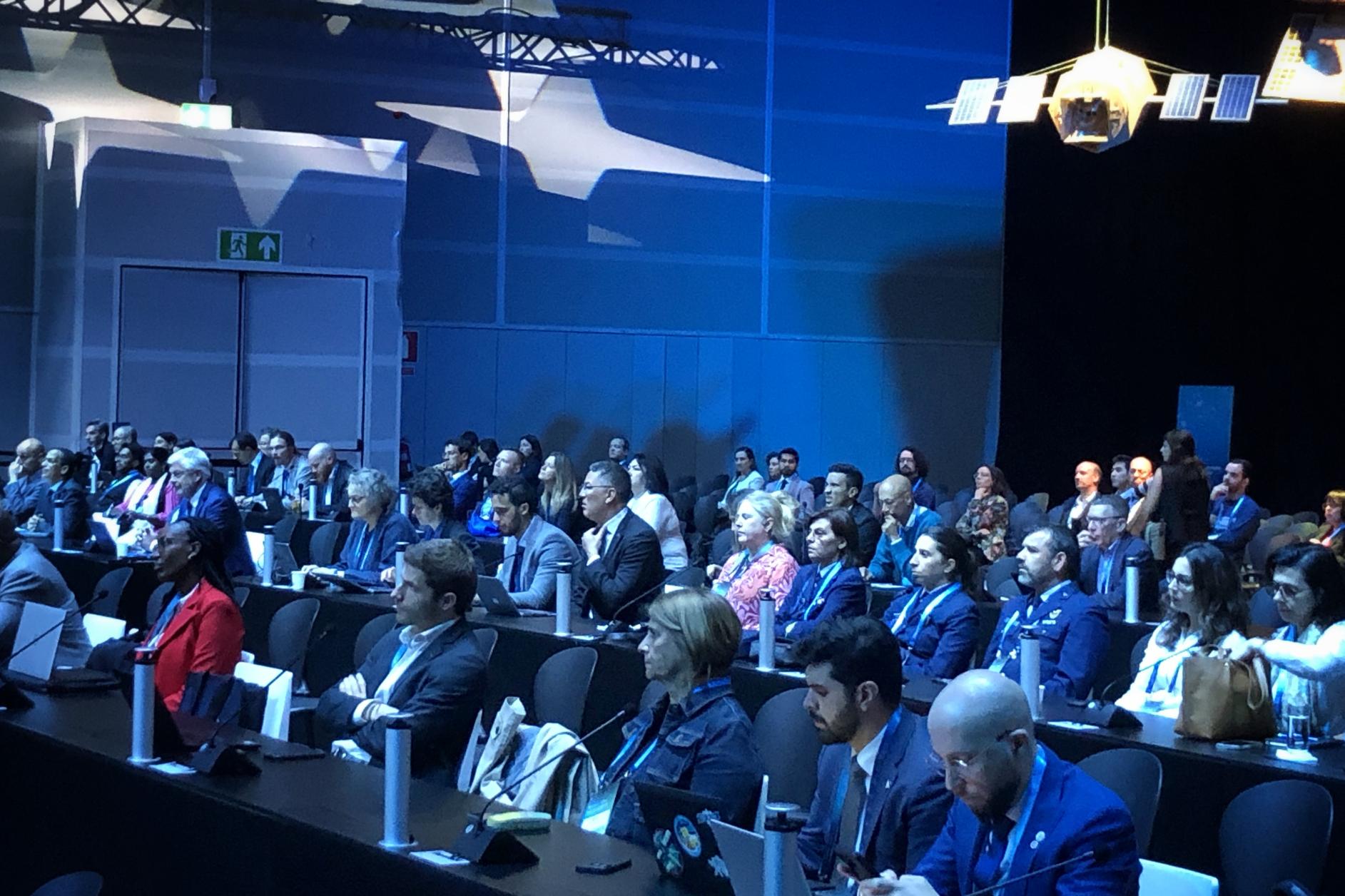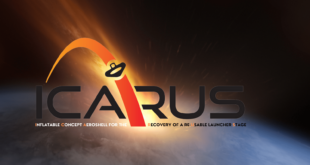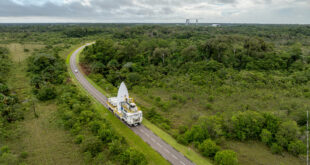by Christophe Bosquillon

The “Management and Sustainability of Space Activities Conference” took place in Lisbon, on May 14 and 15, 2024, totalling over 15 hours of talks. A joint event organized by Portugal with UNOOSA (United Nations Office for Space Affairs), this conference intended to contribute to the discussion on the space sector at the upcoming United Nations Summit of the Future in September 2024. Besides featuring experts’ discussion on the importance of international cooperation and regulations in managing and sustaining outer space activities, a key merit of this conference is to have allowed member states that aren’t dominant space powers to showcase their initiatives. Let’s find out.
UNOOSA’s relevance
The conference marked the culmination of a year-long effort, with two preparatory symposiums featuring over 80 speakers from 22 countries and 20 international organizations. The 1st day covered sustainable space operations, and data fusion and sharing driven by transparency and collaboration between satellite operators. They emphasized the need for a unified legal framework to prevent conflicts and ensure long-term sustainability, while also addressing the challenges of space debris and its impact on future space missions. Speakers underscored the urgency of addressing these complexities and opportunities in a collaborative and multifaceted approach between the various stakeholders: unless a special kind of international cooperation takes place between space agencies and private companies, advancing space technology and minimizing negative environmental impacts will remain mired in a “no action talk only” pattern, and nothing will change. The United Nations and the UN Office for Outer Space Affairs (UNOOSA) were validated as relevant players in leading this global endeavour, due to their unique position to facilitate cooperation between member states.
Emerging Portugal
On the 2nd day, discussions further emphasized the need for a legal framework to govern space resources and ensure equitable access, as well as addressing potential conflicts and ensuring long-term sustainability for future generations. Collaboration between governments and a more strongly involved private sector was also highlighted. The importance of space law and sustainability was illustrated through the ongoing, albeit much delayed efforts in the European Union to harmonize space laws and create a legal framework for addressing sustainability issues, particularly regarding space debris. The conference also promoted the development of new technologies for space debris monitoring and removal. The need for government collaboration through COPUOS was emphasized to match the pace of technology development in space and implement and scale solutions for space sustainability. It was made clear that the aims of Portugal in organizing this conference with UNOOSA were to contribute to the space economy and address environmental issues using space data, legitimizing Portugal’s role as an emerging space nation.
Managing and sustaining space activities in an increasingly crowded, competitive, and geopolitically adversarial space development realm is complex.
America first
Discussions did underscore the complexities and challenges of managing and sustaining outer space activities and the crucial role international cooperation and regulations play in ensuring their long-term success. But at the space farm, some animals still remain more equal than others. The 1st day didn’t waste a minute in introducing the US Department of Commerce’s Office of Space Commerce as a key dominant player in fostering economic growth and technological advancement in the space industry through initiatives like the Traffic Coordination System for Space (TRACKS). Richard DalBello, Director of the Space Situational Awareness (SSA) Mission Office at the National Oceanic and Atmospheric Administration (NOAA), emphasized the need for international partnerships and coordinated systems of SSA providers. There was some room left for Europe and Asia though. Rolf Hansen, a director at the European Commission, discussed the EU’s role in managing and sustaining space activities, including space surveillance, tracking, and space law development. Speakers from Korea highlighted the challenges in achieving sustainable space operations and the importance of collaboration between stakeholders, including industry, government, and regulatory bodies. Panellists emphasized the need for clear, sound, and enforceable regulations, communication, and a balanced approach between technical and regulatory aspects. So, if everyone seems to agree, then what?
Space Traffic Management vs Big Business
Then discussions addressed the challenges of space traffic management and its impact on business. GeoCAT, a European optical data provider, brought up the need for rapid deorbiting mechanisms to preserve access to space and contribute to space sustainability, despite the additional costs and weight. Eutelsat, the first GEO-LEO satellite operator in the world, discussed their commitment to space sustainability and the importance of collaboration with space traffic management companies for operational and timely exchanges of information. OneWeb emphasized the importance of space sustainability as part of their corporate social responsibility policy and the need for cooperation and goodwill between operators to ensure safe and sustainable space traffic management. The Space Data Association (SDA) was introduced as a solution for sharing and validating collision avoidance details and performing conjunction assessments. However, better data solutions are required, such as launching satellites equipped with telescopes to map out the space environment and improve the uncertainty around objects. The European Space Agency (ESA) shared their current projects and future plans, including building a telescope, launching a satellite for mapping space objects, and providing this information to customers. They emphasized the importance of sustainability and making data available for educational and research purposes. The challenges of sharing operational data in the space industry and the importance of transparency for ensuring safety and sustainability were also discussed: if you say that companies have a role in enhancing safety and coordination in space traffic management, but at the same time there is a need for publicly available data, how do you square that with a confidential and proprietary data-driven revenue model?
Hello, World
The technocracy having spoken, the geopolitically juicy part came with the significance of the Lisbon Declaration on outer space and the importance of meaningful multi-stakeholder engagement and international cooperation: speakers from various countries, including Portugal, Belgium, Canada, and Japan, shared their commitments to peaceful and sustainable use of outer space and ongoing efforts to ensure a safe and secure space environment. Japan specifically discussed their initiatives in space situational awareness, safe on-orbit servicing, and transparency guidelines. Japan and Germany shared their perspectives on the need for collaboration in addressing space governance issues, such as space resource development, space traffic management, and space debris. Both countries emphasized the value of the UNOOSA conference as an opportunity to exchange ideas and consider practical measures for preventing harmful interferences and conflicts.
Paraguay’s Ambassador Fati emphasized the importance of sustainable use of space for the benefit of all humankind and the need for multilateral efforts in establishing guidelines for sustainable space activities. Representatives from South Africa, Rwanda, and Switzerland also highlighted the importance of international cooperation and responsible management of space activities. They acknowledged the challenges posed by space debris, space traffic coordination, and space resources and urged the international community to address these issues through cooperation and the establishment of an international mechanism for managing sustainability in outer space. The United Nations Committee on the Peaceful Uses of Outer Space (UNCOPUOS) and the United Nations Office for Outer Space Affairs (UNOOSA) were tasked with continuing their leading roles in the global governance of outer space activities.
More countries took the stage: representatives from Colombia, Iraq, and Luxembourg discussed their commitments to sustainable space exploration and international cooperation. Colombia emphasized the importance of binding standards and international cooperation to ensure long-term sustainability in outer space, with a focus on addressing concerns about space debris, safety, and protecting the space environment. Iraq shared their plans to advance their space program with a focus on peaceful applications and international collaboration, while Luxembourg highlighted their efforts in sustainable space activities, including hosting a high-performance data centre for Earth observation and developing solutions for optimizing water consumption and greenhouse gas monitoring. Experts at the conference also emphasized the need for a legal framework to govern space resources, ensure equitable access, and address potential conflicts, as well as the importance of private sector involvement and collaboration between governments and the private sector to advance our understanding and use of outer space.
Unless a special kind of international cooperation takes place we will remain in a “no action talk only” pattern, and nothing will change.
The Spanish delegate expressed support for international law and the UN’s role in governing outer space, committing to sustainable approaches, and protecting dark and quiet skies. France, which is revising its space legislation, highlighted together with Nigeria the importance of sustainable development and international cooperation for space exploration and activities. Last but not least, Egypt and Fiji emphasized the need for capacity building and technical assistance for developing countries. Pakistan and Russia advocated for an evolving international legal regime for space activities, and delegates discussed multilateral efforts to ensure the long-term sustainability and security of outer space activities.
The Moon and Mars
The conference didn’t skip the crucial issue of identification, extraction, and transportation of space resources, focusing on the Moon and Mars. Discussions emphasized the importance of considering space resources as commodities rather than consumables and the need for a legal framework for their exploration and utilization. The Moon Agreement was highlighted as a useful instrument for extra-terrestrial resources, with the potential for sharing scientific benefits and wider public participation. The challenges of multiple users and safety zones were addressed, along with the role of private actors and the need for legal certainty. The panel concluded that a small set of principles should begin the development of a regulatory framework for space resource exploration and exploitation while keeping intergenerational sustainability and planetary protection in mind. The discussions also touched upon the potential benefits of using resources in space rather than bringing them back to Earth and the importance of long-term sustainability for space exploration. [Frameworks of discussion surrounding space resource utilization and what they imply in the larger picture can also be explored through the various Space Café Law Breakfast with Steven Freeland.]
Summit of the Future
The conference contributed to the upcoming United Nations Summit of the Future in September 2024 as an opportunity to shape the future of multilateralism: part of the agenda is to call for a unified regime for space sustainability through private sector and civil society engagement. Aiming at an inclusive and equitable global governance for space, the Summit for the Future will address actions to create a sustainable legacy for future generations. That includes the responsible use of artificial intelligence and other emerging technologies, while addressing resource utilization, gender equality, and youth participation.
Give UNOOSA (and Portugal) a chance
Managing and sustaining space activities in an increasingly crowded, competitive, and geopolitically adversarial space development realm is complex. The Portuguese National Space Agency was recognized for their involvement in a sustainable space for a sustainable Earth, and Portugal was praised for leading such efforts. Besides the need for international cooperation, the importance of a unified legal framework, transparency, and communication between space-faring nations should be key. The economic benefits of collaborative space initiatives and the potential for space to bring countries together imply solving the challenges of ensuring equitable access to space resources and the role of private sector involvement. That means opportunities for the many, not merely a few space powers. Let’s give UNOOSA (and Portugal) a chance, as they demonstrate their ability to maintain a platform for peaceful and constructive dialogue, while giving a voice to those we seldom hear.

Christophe Bosquillon has a diverse professional background, having operated globally with a focus on the Indo-Pacific region. His experiences in Japan, the Koreas, Taiwan, China, ASEAN, India, Russia, and Australia have given him a deep understanding of the multipolar realpolitik of our world under the Pax Americana. With a background in engineering, trade, and foreign direct investment in industries relevant to Space Resource Utilization (SRU), such as mining, transportation, energy, manufacturing, agrifood, environment, and digitalization, Chris is committed to developing SRU value chains that benefit the Earth. As an executive, owner, writer, and founder of Autonomous Space Futures Ltd, Chris has extensive experience in collaborative policy crafting and works to develop space business and governance models relevant to society. He is a member of NGOs that provide input to the United Nations Committee on the Peaceful Uses of Outer Space (UNCOPUOS) legal subcommittee Working Group on Space Resources. Chris contributes to regulatory clarity on appropriation, priority, sustainability, and sharing in a way that balances national interests with civil society inclusion, provided a transparent due process is followed. When advocating for access to technology and space for the Global South, Chris believes that emerging space powers’ participation in space markets must be commensurate with their interest and involvement in international space politics. He believes that their ability to develop sovereign domestic capabilities with spillover potential is also essential. Chris is keen on ‘Peace Through Strength’ diplomacy and deterrence-based security as enablers of secure space access. He supports sovereign cislunar space situational awareness as mandatory for freedom of circulation in the space domain and deconflicted cooperation on the Moon.





